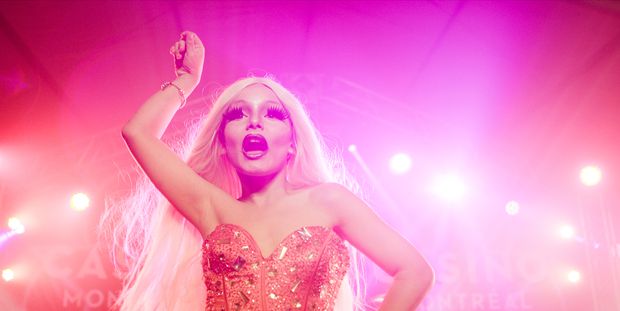In the new documentary Drag Kids, young drag prodigy Queen Lactatia – in a ball gown, blonde wig, lashes and lipstick – whirls around the stage as the audience cheers. Beneath the laboriously crafted persona is Nemis, aged 9, who says in the film, as if to get ahead of its detractors, “I wish people understood that drag is a way of expression.”
Along with Nemis, Drag Kids follows the creative pursuits of Stephan, 9, Jason, 11, and Bracken, 11, as the group prepares to perform together in Montreal – their various drag personalities uniting for one exuberant spectacle.
But beyond the heartening footage of the Drag Kids rehearsing – Jason’s dad moving a coffee table so the two can run through choreography, mothers and sisters doing hair and makeup, fathers hugging their sons as they exit the stage in heels – is a daunting reality. For the Drag Kids, drag is as much an outlet for expression and fun as it is an increased threat of bullying. “Kids can be really mean,” Jason’s dad says in the film. “And some adults, too.”
When the documentary’s trailer was promoted by a CBC Twitter account this month, the post amassed 3,200 replies, the vast majority decrying the CBC for producing the film and vilifying the Drag Kids’ parents. Many accused the parents of child abuse and suggested they were setting their kids up for dangerous attention.
Opinion: How low will CBC TV bosses go in search of ratings and ad dollars?
CBC’s The National acknowledges missteps and looks to retool — while pledging to keep its four hosts
Drag Kids follows the creative pursuits of Nemis, Stephan, Jason and Bracken as the group prepares to perform together in Montreal.
HANDOUT
On Facebook, Conservative Member of Parliament Brad Trost, who represents the riding of Saskatoon-University, posted that “Our tax-payer funded broadcaster, the CBC, has been espousing some pretty worrying topics seeking to touch our children.”
Below Trost’s post, Inverness Community Church Pastor Mark Palmer, of Inverness, N.S., wrote, “Sexualizing minors is abuse and they should be investigated.”
While Palmer declined to comment further, Trost told The Globe and Mail, “Any sort of sexualizing of children is just not a good thing, not for the broader society and definitely not for the children involved … Kids should not be exploited by adults, even if children want to do something. As I tell my little daughter, she is the most dangerous thing to herself, and Daddy’s job is to protect her from everything that will hurt her, including her own ideas, be that climbing on a table or doing something like what these kids are doing.”
Whether drag is inherently sexual is a point of disagreement between the film’s opponents and supporters. “Sexuality is not something these kids are bringing into it," says the film’s director Megan Wennberg. “That’s something adults on the internet are bringing into it.”
Bracken, 12, can spend more than two hours achieving her signature look.
HANDOUT
Bracken’s mother, Dominique, feels that the accusations are unfairly targeted. “If these kids were doing pantomime or a circus school, we wouldn’t be seeing this huge reaction," she says. "But the moment you talk about queer culture, people push back.”
Wennberg says that the Drag Kids’ parents act as a barricade between their children and online hate, removing homophobic and transphobic comments from their kids’ social-media channels before letting them log on. In the film, Stephan’s mom asks him to go play in another room while she moderates his Facebook page.
STORY CONTINUES BELOW ADVERTISEMENT
“If people would just listen to these kids speak for themselves, I think they could learn something about love and acceptance and having it be okay to be honest with yourself about who you are,” Wennberg says.
Christopher Shillington is a registered psychotherapist and the clinical director of Toronto’s Umbrella Mental Health Network, which focuses on supporting LGBTQ+ clients aged 13 and older. He perceives the backlash as being “against an entire societal push toward more fluidity.” But he says it is not only healthy, but important, for young people to pursue expressions of identity. “To prevent kids from exploring their gender expression is far more damaging than the effects of the bullying, homophobia and transphobia that they may experience,” he says.
Shillington disputes any assertion that kids who partake in drag may become vulnerable to abuse. “It’s entirely unfounded,” he says. “What we know about adults who perpetrate against minors is that they tend to target kids who are isolated, kids who are not connected with community. These kids are not at risk of that. They’re very much connected."
As the Drag Kids practice their routine, fumbling and trying again to get it right, out of costume but no less committed, the choreographer – motivational if not a little fatigued – shouts out a poignant instruction: “You’re performing! That’s your home!”
Live your best. We have a daily Life & Arts newsletter, providing you with our latest stories on health, travel, food and culture. Sign up today.

/arc-anglerfish-tgam-prod-tgam.s3.amazonaws.com/public/3WNTEN3OBZEJLF7ON7R5BF5DQE.jpg)
/arc-anglerfish-tgam-prod-tgam.s3.amazonaws.com/public/CPFFR7KIJRGRRHTUJZ2T4CUVVA.jpg)






















